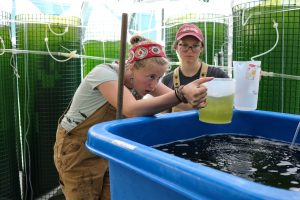2021 Symposium
The SEA Fellows Program cumulated in a virtual symposium on Tuesday, August 10, 2021 from 1 to 2:15 PM EDT.
The full set of abstracts and a list of presenters, co-authors and their abstracts are available here, and the posters can be accessed here. Each poster was presented twice during the event:
| Session | Poster | Presenter(s) | Title |
| Aquaculture Research & Development | 1 | Abby Gray | Maine Aquaculture Innovation Center’s role in Maine aquaculture, 2006-2021 |
| 2 | Beatrice Johnson | How different environments facilitate scallop growth and influence profitability | |
| 3 | Jack Rigazio | Comparing oyster feeding rates on live versus frozen algae cells | |
| Biodiversity & Ocean Health | 4 | James Greenwood | Improving methods to survey eelgrass with Remotely Operated Underwater Vehicles (ROVs) |
| 5 | JoAnna Shaw | Observing microplastics in the Damariscotta River | |
| 6 | Jocelyn Cooper | Comparative Analysis of Red Tree Coral spermatocyst size before versus after thermal variability events | |
| Coastal Ecology & Management | 7 | Carolina Rolfe & Amelia Papi | Integrating local knowledge and ecological surveys to monitor intertidal shellfish |
| 8 | Madison Bailey | A guide to recreational shellfishing in Brunswick | |
| 9 | Megan Alberding | Understanding eDNA data through environmental measurements and nutrient analyses | |
| Ecology of Commercially & Ecologically Important Species | 10 | Adelaide Mullin | Exploring strategies to reduce post-harvest mortality in the Maine and Canadian lobster fisheries |
| 11 | Emily Patrick | Prey preference of American lobster larvae in the Gulf of Maine’s pelagic food web | |
| 12 | Sophie Swain | Density dependent growth factors and their effect on American glass eel growth rates | |
| eDNA in Ocean Ecosystems | 13 | Claire Volk | Developing eDNA tools to count harmful algae in Maine waters |
| 14 | Curtis Morris | Surmounting methodology hurdles in the use of eDNA to study food web interactions of American lobster larvae | |
| 15 | Samuel Burgess | Two methods to evaluate sea scallop spawning in Maine | |
| Farming Shellfish | 16 | Emily Rand | Do seed oysters grow better in OysterGro or Zapco Cages and how does oyster density effect growth? |
| 17 | Hunter Carson | Comparing growth and survivorship of three commercial shellfish species in vacant lobster pounds in Downeast Maine | |
| 18 | Sydney Avena | The effects of different gear types on farming Atlantic sea scallops | |
| Lobster Ecology | 19 | Katey Gould | Are marine ecosystem changes affecting lobster sheltering behavior in coastal Maine? |
| 20 | Katherine Burnham | Does the invasive alga Dasysiphonia japonica impact American lobster shelter selection and postlarval settlement: experimental methods | |
| 21 | Lydia Harris | Counting lobsters with an underwater robot | |
| Seaweed Ecology & Aquaculture | 22 | Jillian Galloway | What type of material do young dulse prefer to settle on? |
| 23 | Lauren Maeve Trainor | Virtual experiential learning activity gives recognition to algal aquaculture in Maine | |
| 24 | Nelson Wu | Better marketing for Maine sea vegetables |
2021 SEA Fellows Program
Impacts of climate change, coupled with social and economic disruption created by the pandemic, have highlighted the importance of students concurrently gaining technical knowledge and experience and experience in collaboration, knowledge co-production and leadership. The 2021 Sea Fellows Program has been designed with these student and societal needs in mind. Through a series of virtual round tables, held biweekly on Wednesdays at noon (June 2-August 11), SEA (Science for Economic Impact and Application) Fellows are learning more about climate-relevant science and action; meeting other undergraduate students statewide who share their interests in solutions-oriented research and public engagement; and honing their skills in communication and collaboration. The program culminates in the public symposium on August 10, where students share their summer research.
Partners & Support
The SEA Fellows Program is supported by UMaine’s Darling Marine Center and the Downeast Institute, which serves as the University of Maine at Machias’ marine field station. Additional support of the program in the last five years has come from US National Science Foundation awards to Maine EPSCoR at UMaine, the UMS Research Reinvestment Fund, Henry David Thoreau Foundation, and grants led by individual collaborating faculty and external mentors.
To learn how you can be involved as a student or as an industry or academic mentor, please contact Heather Leslie or Brian Beal.

